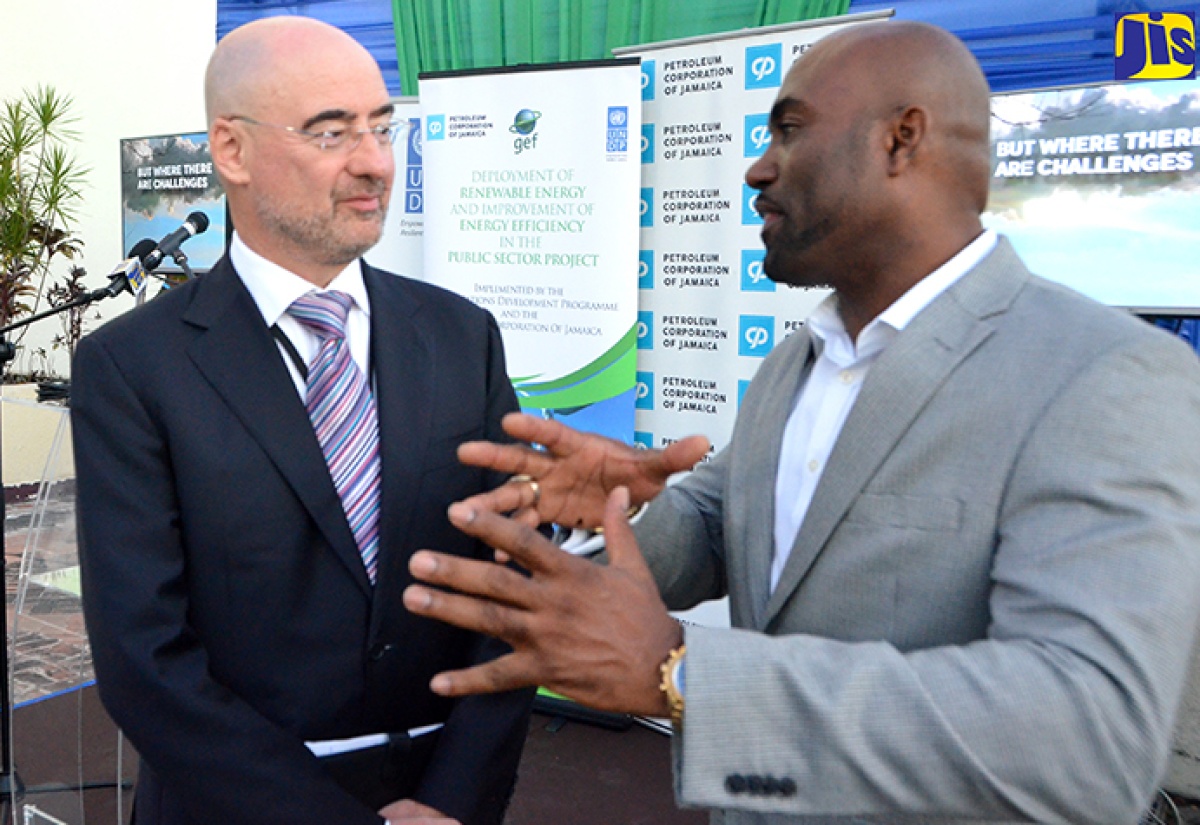Gov’t Launches Project to Cut Energy Costs in Public Sector
By: , December 8, 2016The Key Point:
The Facts
- The Deployment of Renewable Energy and Improvement of Energy Efficiency in the Public Sector Project is being undertaken through US$12,003,741 in funding from the Global Environment Facility (GEF) Trust Fund.
- The project, which started in September 2016, is scheduled to end on August 31, 2019.
The Full Story
The Government is undertaking a three-year project that is expected to cut energy costs in the public sector by putting renewable systems in place and increasing conservation methods.
The Deployment of Renewable Energy and Improvement of Energy Efficiency in the Public Sector Project is being undertaken through US$12,003,741 in funding from the Global Environment Facility (GEF) Trust Fund.
The United Nations Development Programme (UNDP) is implementing the initiative through partnership with the Petroleum Corporation of Jamaica (PCJ).
Speaking at the launch on November 30 at the PCJ in New Kingston, Minister of Science, Energy and Technology, Dr. the Hon. Andrew Wheatley, said he is pleased that the project seeks to increase the use of renewable energy and reduce public-sector energy consumption, while driving efficiency.
He noted that the public sector is a big consumer of electricity. In 2015, the sector accounted for 476.1 gigawatts (GW) of electricity, representing 15.5 per cent of total electricity sales.
“While this is still relatively high, we have been working assiduously to reduce our overall consumption. Through the Energy Efficiency and Conservation Programme we have seen significant savings and reductions within several government facilities,” Dr. Wheatley said.
Manager, Renewable Energy and Energy Efficiency, PCJ, Dr. Peter Ruddock, informed that as part of the project, energy-efficient systems will be installed at health facilities.
These include the National Chest Hospital, Bellevue Hospital, and the Sir John Golding Rehabilitation Centre, St. Andrew; May Pen Hospital, Clarendon; Savanna-la-Mar, Westmoreland; and the Black River Hospital in St. Elizabeth.
“Our assessments reveal that our energy interventions there will result in high savings and good return on investments,” Dr. Ruddock said.
He noted that under the initiative, the PCJ will be responsible for the audit and implementation of the renewable energy and energy-efficiency interventions.
“That will cost US$2 million. The PCJ is providing US$1.38 million, while the Global Environment Facility Trust Fund will provide US$650,000. We consider this a worthwhile investment for the Government and people of Jamaica,” Dr. Ruddock said.
Resident Representative, UNDP, Bruno Pouezat, said the project will help Jamaica’s energy sector contribute to the achievement of the country’s renewable-energy targets.
He noted that, at present, Jamaica is 90 per cent dependent on fossil fuels for its energy needs.
“The National Energy Policy aims for more than 20 per cent of Jamaica’s overall energy mix to come from renewable sources by 2030. These targets are not only achievable, they are critical to Jamaica’s human-development aspirations,” he said.
Mr. Pouezat noted that the health sector was targeted for priority attention based on high operational costs.
He noted that in 2014, the Government spent $15.5 billion on electricity, with six per cent of this going to the health sector.
He said the UNDP and its partners are optimistic about this landmark project and its potential to demonstrate how best to expand renewable energy and energy efficiency in Jamaica to benefit the economy and the quality of life of the Jamaican people.
“I wish to reiterate UNDP’s continued commitment to supporting the Government and people of Jamaica in achieving these goals,” he said.
The project, which started in September 2016, is scheduled to end on August 31, 2019.


